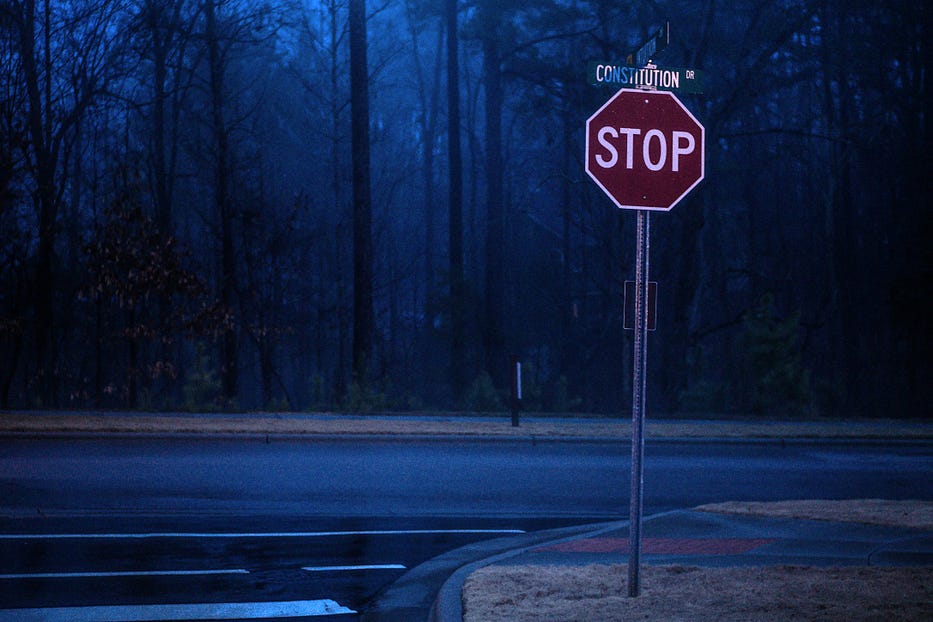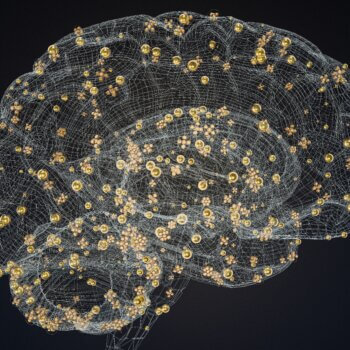I’ve never been as aware of the human predisposition toward pack mentality — the urge to be part of something bigger than us, and to find safety in numbers — as when I have stood opposed to any particular instance of groupthink. When it has happened, the act of going against the grain has more often than not triggered strong reactions in others: insecurities or fears, against which my dissenting beliefs or choices somehow represent a threat.
I’ve written before that rules and laws — the things that shape rituals and norms — exist for two primary reasons: first, to allow the rule-makers to establish and exert control over others; and second, so that these same folks can indoctrinate the masses into their worldview — one that overwhelmingly measures human interaction through the lens of mistrust.
In other words, rules and laws arise from fear. If we didn’t fear the outcome of not advocating, coercing or mandating certain behaviors, there would be no perceived or real need for them.
If we truly trusted one another and equally, ourselves, they would be pointless, because mistrust would cease to exist. We would count on one another to make good choices!
Control
The urge to control is as old as our species, and stems — in line with Buddhist doctrine — from desires that all of us have, but on which we act quite differently. Some of us act in a self-serving manner, while others do so in promotion of communal benefit. For most of us, desires are expressed reasonably. Many aim toward modest comforts: food on the table, a dry and warm home, clothes to make us feel just a little bit special; a splurge every now and then… Others focus on feeding a universally held desire for purpose, however we each define that word: being a good person in daily life and acts; raising happy, healthy children to fulfill a core emotional need to give love; leaving the world a little better than we found it; pursuing self-knowledge, or self-mastery; or solving life’s “sticky problems”, like hunger, sickness, or the destruction of the land.
Control, in all of these cases, is primarily expressed as self-control, although we often enlist others’ help in the process of feeding our desires. This type of “controlling” behavior is benign at worst, and often results in a net positive influence toward collective wellbeing, or reach. Every happy, productive member of society contributes, in some regard, to the whole.
But there is another type of control that stems from something darker. Any animal who fears being attacked — or already hurts — can and often will turn that pain outward, toward others. Humans are masters at this. We lash out for several reasons. It could be that we have no innate self-confidence, or self-compassion, and thus let life fill us with dread. We could aspire to do damage to others so that we feel less alone in our pain — helping us to believe, perversely, that we are part of a community of fellow sufferers. It could be to seek retribution for how we feel, but don’t want to, singling out those we believe caused our pain, or proxies who remind us of those who did. It could be a cry for help, made the only way we know how — destructively, loudly — in a bid to find someone who will make what we feel inside go away. And it could be to fill a giant void with successes and prizes that distract us from the fact that inside we feel hollow, but hope, somehow, that material things or titles will externally compensate for our innate lack of serenity.

We recognize these people everywhere: the angry young man; the daredevil; the bully; the constant critic; the driven competitor; the cutthroat colleague, or boss; the biting comic; the lawmaker; the enforcer; the materialist; the bad boy; the abusive spouse.
In each of these cases, controlling others — their health, their happiness, their peace, their prospects, their feelings of adequacy, their own actions — becomes a pathology and a distraction from what is really going on, which is that something isn’t right inside.
Many of these people, sadly, die without ever recognizing, let alone addressing, their own disease. Instead, they live for controls as a mechanism for foisting their own inner worlds onto others.
Truly happy people have no need to control others. Rather than seeing them as competitors or even unwelcome mirrors, well-balanced people see others as sovereign travelers, collaborators and friends — people with whom to share discovery, adventure, a meal, a day, a project, an experience or a lifetime; or, barring common ground, as benign cohabitants of a town or nation.
Simply put, happy people have no time to focus on what other people are or are not doing, unless their actions contributes toward building communitas — the spirit of community, or bonding.
They’re too busy living their lives.
Mistrust
Control’s older sister is mistrust. Mistrust is what happens when our own inner confidence is lacking. Someone who feels truly confident — not with outward bravado, but with inner calm — doesn’t need external validation, or for others to make the same choices as they do.
In fact, you can recognize someone truly confident by the fact that they are not looking to fit in — to look, act or choose things that others do, ritualistically.
Mistrust — fear, really — gave rise to the laws of the land (and with them, the need to control others). It led to to religions’ rituals (and the attendant controls for being accepted and remaining in good standing, as a member). It spurred the fields of law, politics, enforcement and insurance. It fills employee manuals, articles of incorporation and governance models. It controls the built environment in the application of building codes, traffic control, speed limits, zoning resolutions, public committees and neighborhood watches. It indoctrinates our children with education and testing standards, to hammer them into comforting sameness. It guides financial tools like risk assessment, investment and interest rates. It defines protocols of any kind.

We are a species mired in ubiquitous, heavy-handed mistrust-fueled control. And whether you live under the banner of communism, democracy or dictatorship, the fact remains that in any structural environment, it is only as long as you abide by the legal, financial and institutional rules, regulations and standards as set forth by those in control that you are afford any simulacrum of freedom within the entrenched system.
In other words, on a deep level, all political systems are similarly controlling — as much as you’d surely argue otherwise. Their differences are — pragmatically speaking — measured by degrees and illusions. That is, they are relative. Rich/poor. Insider/outsider. Powerful/powerless. Hunter/hunted. Free/jailed. Zealot/critic. All of these exist in copious supply in every system. Freedom is relative. Oppression is relative. Which side of each of these “coins” describes your situation depends entirely on who you are and who you know. For example, for every American rags-to-riches story, there are literally thousands of home-grown stories of oppression and poverty. For every jailed journalist in China, there are dozens if not hundreds of capitalist titans there, living high off the hog.
The point here is that in no human system of governance that I know of, can one simply do what one wishes, and make choices in accordance with nothing but one’s own judgment, unless these happen to be sanctioned by the controllers.
Going against the grain is dangerous, pretty much everywhere.
Standouts
And yet: the world is full of people who stick out like sore thumbs. They mostly live within the constructed world of rites, norms and rituals — the soft controls seeded by societal mistrust — but they seem, somehow, to live apart from them all emotionally. They accept that rules exist and act mostly within their boundaries, while simultaneously refusing to submit in any way to defining life — or themselves — by these possibility-stiflers.

You recognize these people. They don’t dress like everyone else, and not only aren’t embarrassed to stand out, they often lavish expressing their ‘otherness’ outwardly. They don’t practice the same rituals as the masses do, like where to vacation or eat, and are always on the hunt for new experiences to broaden their personal contexts. They ask themselves — and others — why things are the way they are, while continually attempting to find better alternatives, not only for themselves, but often in the name of others’ freedoms, too. They hold a healthy mistrust for all things legislated and are happy to occasionally “color outside of the lines,” just as long as doing so doesn’t hurt others. Accordingly, they often flirt with the edges of the laws and norms, either in direct challenge or to find out just how much their independence will be tolerated by the enforcers. They are invariably asking themselves what is right, instead of what is allowed. They especially chafe at being told what to do or why they should do it. And they have no interest in keeping up with the Joneses or seeking the trophies their colleagues do: job titles, houses, cars, trophy meals, accolades and other conspicuously pervasive signs of groupthink.
What they are is deeply connected to their inner lives. To them, life is about aligning their actions with their authentic selves. This includes their daily acts, their vocations, their friendships and their life goals. They are hungry for anything that can feed these deeper thirsts; but wherever they may be headed, they are also happy where they are, and recognize how freeing it is to be unencumbered by playbooks, especially within the context of others’ pervasive self-restraint.
Standouts usually don’t pull punches in conversation. They spend little time on niceties or engaging in small talk. They let you know what interests them and walk away if it doesn’t, because they are focused on meaningful exchanges that open doors to transforming lives, rather than closing doors by policing lives.
Sports, weather, trappings, work, parenting and politics are the conversational subjects to which most people default. For a tiny, select group of exceptional humans, these things really are interesting, and worth the air space. When Elon Musk speaks about work, one imagines it must be utterly riveting — like being in school or glimpsing the future. When Ellis Marsalis talks about his kids — every one of them a famed musician and onetime collaborator, by this point — one imagines the stories he tells of their global travels together are pretty epic. When a FEMA agent talks about rescuing people from under 12 feet of hurricane water, one is presumably rapt by “weather talk”. And when my friend Shen Tong talks about inciting a student uprising in Beijing in 1980, resulting in the Tiananmen Square riots and turning him into a famed dissident, I’m all ears about politics. But these are exceptions, and moreover, they are all personal stories — not gossip. That’s what makes listening to what these people have seen or learned interesting.

So, while our kids, the weather, sports, politics and work are low-hanging fruit for most of us, they are near-universally less exciting to discuss with one another than deeply personal and/or consequential ideas about the world, what we have learned, and how to maximize our impact and time, now and in the future.
Standouts invariably take the big leap — in words and in deeds — and if you’re going to stand at the edge to watch, unsure of whether you trust their lead (or yourself) while you struggle to decide whether it’s safe or acceptable to join them, you’ll be looking for a new dance partner.
Not every standout is fascinating. It all depends on the context of their lives, how dynamic they are, and their capacity for communication and collaboration. Some seem just… weird. Others, callous or self-absorbed. Some are too niche to connect easily. But the chances are far greater that someone who spends a solid chunk of their life tuning in to their inner compass is going aim their actions more incisively — and more expansively — than someone who skates around on the surface of things, looking to fit in or for cues to what those in their community find acceptable, “normal” and reasonable. Those who stand out are, typically, wild cards; and you know it the moment you meet one, whether or not you appreciate it — or them.
An old The Far Side cartoon by Gary Larson comes to mind…

To an original — to borrow a term from Adam Grant’s excellent book, The Originals — being told “one mustn’t”, “you can’t”, “the rules are” or “I’d never” only supercharges their desire to distance themselves from these fabricated constraints.
That’s because fabricated is exactly what any and all rules are. Real rules are physiological, like those that define gravity or electricity, and are there to be discovered, understood and harnessed. Man-made rules, on the other hand, are pure fictions, made up to establish control and mitigate mistrust, like the mandate to stop moving in the presence of a glowing red light, even if there’s no one else in sight.
Rules — said another way — are there to create uniformity in behavior and thought, rather than flex under different applications or contexts, let alone cultivate individual self-discovery, authentic expression or — like the red light example — exercise one’s capacity for good judgment.
Judgment is only for trusting souls.
The Case for Reasoning
I’ll admit: I don’t like rules. I hate them. Not all rules. I think the one about not killing other people is good. But the one about sitting at an empty intersection when no one else is around, because a light bids me to do so, is ridiculous. I see most rules as suggestions — there to make sure you think about things before you act, to bring your best capacity for reasonable decision-making to the task at hand, whatever it is.

As a result of this, I have been stopped by police and excoriated by other drivers more times than I can count. And in spite of it, all I can still see is their nonsensical behavior.
At the very least, reasonableness is what law should aim to engender. “Don’t be an idiot.” Or, to counter a more pervasive human trait, “Don’t risk or ruin someone’s day — or life — in the process of making your own better.” Essentially, “Don’t be an assh*le.” The problem is that many of society’s assh*les color inside the lines, not outside of them. They have simply found ways to do bad things without breaking enforceable laws, by playing one rule off another; or flaunt them within well-worn channels, knowing that there is little chance they will pay a price for their transgressions.
A certain orange gentleman comes to mind.
This is decidedly not what I mean when referring to people who don’t define themselves by laws or norms.
Conversely, there are some very fine people who have focused more on navigating their inner truths than in learning how to play by — or usurp — the rule book, thereby unwittingly finding themselves on the wrong side of a law, to be punished unfairly for their transgressions.
For some, the difference between punishment and reward is how well they play the game, rather than how well they adhere to societal norms. In my view, as disdainful as I am about norms in general, that renders a system of rules even more nonsensical.
We live in a topsy-turvy world of ever-morphing regulation. Truths that land you in jail one day, suddenly don’t the next, depending on who’s in charge of the nation, on any given year, or with what faction of the population you happen to identify politically, racially, religiously, or socio-economically. Too often, people are incited to violent protest to “defend” their version of reality. These folks attempt to bring (or return) those who champion their views to power, so that they can institute controls over those who would dare to disagree, or seek to live differently.
We call this politics. But politics are overwhelmingly borne out of crippling mistrust, and fear.
Abortion. Healthcare. Education. Fossil fuels. Taxes. Guns. Drugs. Race. Social services. There isn’t one “big” subject that the majority of Americans would agree on [to pick on an easy target]. In the U.S. of A., control and mistrust rule the day, every day.

Rinse, repeat.
All of this makes the very idea of norms moot, because these things are relative to the proselytizer and the audience. In the U.S., as elsewhere, regulation is a kind of “flavor of the month”, because what’s legal or acceptable keeps changing with every election cycle, or era.
So why adhere to any of it? Why not just wait out the storm, or live mostly within the lines without being swept up into the emotional maelstrom of fear-mongering controls and regulations?
That is, other than red lights. Those seem to survive election cycles, sadly.
Final Thoughts
I am not advocating lawlessness. I am pointing out how ridiculous most laws and norms really are. I am saying that they are mostly enforced to neuter critical thinking, sovereign judgment and personal growth in favor of middle-of-the-road, toe-the-line, risk-diluting sameness. This is a failure to recognize the inherent uniqueness and complexity of each and every human, and it sells our capacity for reasoning short. I think this is a huge problem in society, as it teaches us not to question or use our own judgment, and not to tune in to our inner voices, without fear of reprisal for questioning the status quo.
The last thing someone in power wants is for people to start questioning their judgments. We have all of human history to see what results from that.
War, and change.
I am equally positing that in our bid to control people and mitigate what we see as unacceptable threats to rule adherence, we are tuning our societies’ mindsets toward fear of outliers. With these structures, we are indoctrinating every citizen as acolytes — who then turn around the vilify those who stand out, or who question these man-made fictions.
We start doing this to our children, by what we teach them matters, how we teach them to act, and which aspects of their character we do or do not develop. Because our capacity to choose where to aim our energies is effectively limitless — bound only by economics, and the imagination of our parents and teachers, the development of our minds and capacities can be aimed anywhere. Therein lies the critical importance of setting up a strong foundation for life, aimed as much inward (relationship with the self) as outward (interaction with the world).

We have created a world built on mistrust whose natural outgrowth is cultivating the desire — the perceived need — to control outcomes in one’s favor. We’ve done this by engineering a system of (false) scarcity, rather than cultivating one of (real) plenty, for no justifiable reason other than personal (capital) gain. This genius idea — that there is not enough, therefore we must compete for a piece of it — was the “original sin” of our species. The creation of rules and regulations benefited a subset of humans, because fear galvanized the masses to toe the line, lest they miss out on the scraps.
We compete for things that no underlying truth necessitates: food, shelter, work, relationships… with human ingenuity, we can produce as much of all of it — in perpetuity — as every single human needs. Responsible stewardship of the physical world and creative enterprise within the emotional one are both well within human reach.
We have simply chosen not to; and as a result, we have turned humans into competitors, rather than collaborators. We have robbed ourselves of true, pervasive wellbeing, and we begin teaching our children these behaviors as soon as they are born.
It needn’t be thus.
Instead of indoctrinating them in 19th century rote pedagogies (thank you, Adam Smith and the Industrial Revolution) whose relevance are diminishing daily, schools should promote children’s inherent open-ended curiosity, and cultivate their equally inherent uniqueness, through coursework in philosophy, self-discovery, mindfulness, critical thinking and open-ended exploratory activities intended to open doors, rather than label and thus close them. These things would help us tune into our inner selves, without prejudice to outcomes, let alone judgments, like those created by competition-fueling grades and hierarchies. Schools should also foster our acceptance and understanding of other humans, through lessons in empathy, collaboration, debate and cross-cultural exchanges, to stretch our social contexts.

And parents should stop the wholesale outsourcing of child-rearing to these institutions, even if they are cauldrons of human development potential. Today, parents and teachers overwhelmingly champion rule-following. “Do what I say.” “Don’t do that.” “I am in the adult (in control).” “This is the right answer.” “That one is wrong.” “If you want to win, you have to be better than others.” “When you grow up…”
Every one of these sentences closes doors rather than opens them, and seeds the fear of ending up on the wrong side of any contest.
Instead, all adults should cultivate what they are best positioned to do, with the children in their charge: their emotional fortitude, based first and foremost on compassionate self-acceptance. These are foundational qualities that will serve any child through a lifetime of expansive, sometimes risk-taking exploration, instead of watching too many of them — us — shrink from challenges and opportunities, in order to “fit in” to a group, toe societal norms, and give in to the fear and mistrust that we learned were “normal”, and “just the way things are.”
They “are”, because we “made them so”.
There’s enough of that, as it is.
We need more standouts.





























